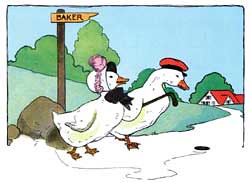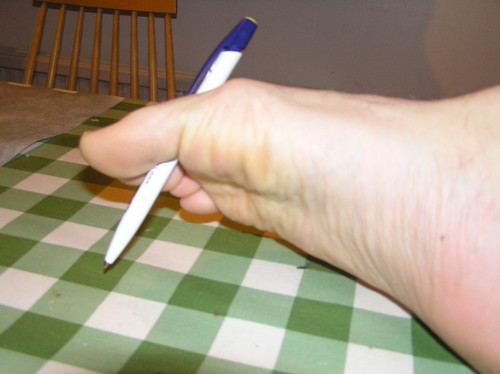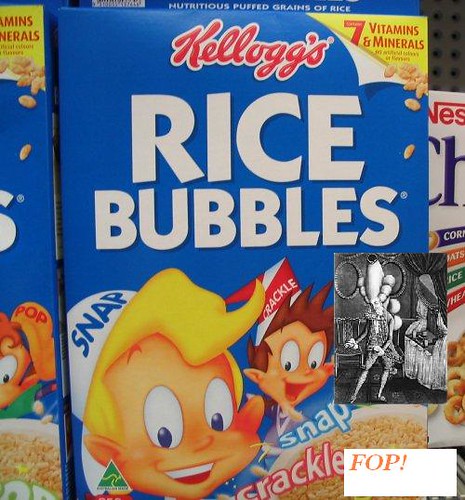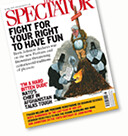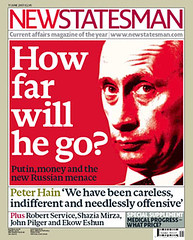A few years ago I did a review of The (Sydney) Magazine that came every month with The Sydney Morning Herald. It was basically an awful advertising vehicle - the first eight pages, and every second page after that, were all ads. Due to some publishing edict from on high, the staff writers all had a habit of beginning their articles like this:
We know Sydney is a great city...
Sydney is a wonderful place to live...
Of course, we're all wonderfully privileged to live in Sydney, one of the most beautiful cities in the world...
Sometimes, they would employ a lyrical non-sequitur, for instance:
Dogs make me sneeze. Isn't Sydney a great city?
But usually, brute repetition of the words 'Sydney', 'great' and 'city' seemed to be the thing. Those quotes above are all paraphrases, but I'm not really exaggerating the content of the magazine, which was just the usual yuppie clap-trap, all 'lifestyle' columns with neither life nor style. I filled several lines of my review by just repeating these quotes from the magazine.
Anyway, I got an eerie sense of deja vu when I opened a copy of The Age this morning. The cover of their arts section, (which is sold, in another bizarro editorial decision, separate from the rest of the paper) is titled - wait for it - Winter Reigns: Why Melbourne is the queen of cool. And gets worse from there:
'A2 celebrates all that is great about midwinter Melbourne'.
'In Melbourne we already know this, because winter is the season for festivals...'
'People in Melbourne pretend they like nice, pleasant, calm, don't-rock-the-boat, balmy, sea-breezy weather...'
'Our natural state is winter and Melburnians are so desperate to embrace the cold that even at the height of summer... they rush to Pellegrini's to wrap their icy paws around a steaming flat white.'
'Melburnians love winter fashion because every body gets to wear it, writes JBB.'
The headlines themselves range from cliched and meaningless:
Bleak is the new black
To the downright snobbish:
Peasant food for the time-rich.
What is it about these big newspaper publications that makes them give in to this kind of crass, meaningless pride? Is it a kind of displaced patriotism (patriotism being a bad word now amongst many of the people who regularly read these papers)? The only difference I can see between The (Sydney) Magazine and the arts pages of The Age are that, while the former displays the worst kind of oafish egotism, the latter has a more inward-looking vanity. The Age is like that irritating cousin who constantly talks about what they did and what they're doing and what they will do, but somehow never get to talking about you. The Age affects self-knowledge, but it's all really quite simple and arrogant self-display: they talk about what all of Melbourne is doing and what everyone in Melbourne likes.
Basically, they're huge liars. But they haven't let it stop them yet.
Saturday, June 30, 2007
A Suggested Cultural Activity
No 437: The Jane Austen Breeding Group
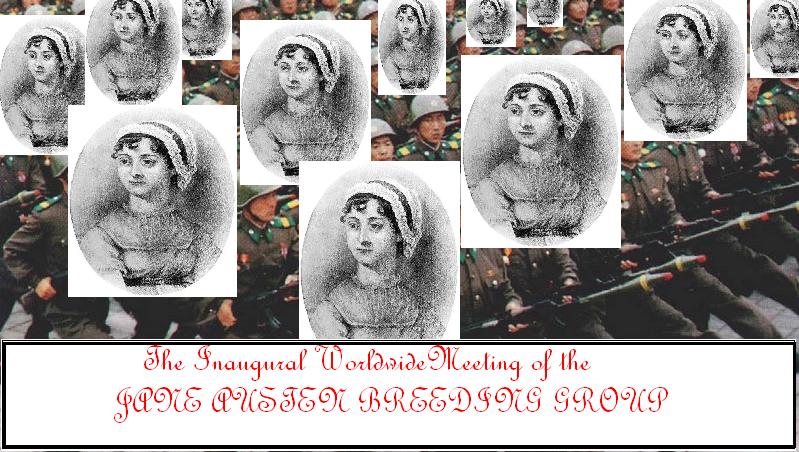
Dear Jane, Jane, Jane, Jane, Jane, Jane, Jane, Jane, Jane, Jane, Jane, Jane, Jane, Jane, Jane, Jane, Jane, Jane, Jane, Jane, Jane, Jane, Jane, Jane, Jane, Jane, Jane, Jane, Jane, Jane, Jane, Jane, Jane, Jane, Jane, Jane, Jane, Jane, Jane, Jane, Jane, Jane, Jane, Jane, Jane, Jane, Jane, Jane, Jane, Jane, Jane, Jane, Jane, Jane, Jane, Jane, Jane, Jane, Jane, Jane, Jane, Jane, Jane, Jane, Jane, Jane, Jane, Jane, Jane, Jane, Jane, Jane, Jane, Jane, Jane, Jane, Jane, Jane, Jane, Jane, Jane, Jane, Jane, Jane, Jane, Jane, Jane, Jane, Jane, Jane, Jane, Jane, Jane, Jane, Jane, Jane, Jane, Jane, Jane, Jane, Jane, Jane, Jane, Jane, Jane, Jane, Jane, Jane, Jane, Jane, Jane, Jane, Jane, Jane, Jane, Jane, Jane, Jane, Jane, Jane, Jane, Jane, Jane, Jane, Jane, Jane, Jane, Jane, Jane, Jane, Jane, Jane, Jane, Jane, Jane, Jane, Jane, Jane, Jane, Jane, Jane, Jane, Jane, Jane, Jane, Jane, Jane, Jane, Jane, Jane, Jane, Jane, Jane, Jane, Jane, Jane, Jane, Jane, Jane, Jane, Jane, Jane, Jane, Jane, Jane, Jane, Jane, Jane, Jane, Jane, Jane, Jane, Jane, Jane, Jane, Jane, Jane, Jane, Jane, Jane, Jane, Jane, Jane, Jane, Jane, Jane, Jane, Jane, Jane, Jane, Jane, Jane, Jane, Jane, Jane, Jane, Jane, Jane, Jane, Jane, Jane, Jane, Jane, Jane, Jane, Jane, Jane, not to mention Jane and Jane and Jane and Jane and Jane and Jane and Jane and Jane and Jane and Jane and Jane and Jane and Jane and Jane and Jane and Jane and Jane and Jane and Jane and Jane and Jane and Jane and Jane and Jane and as well as Jane and of course Jane and of course Jane and of course Jane and of course Jane and of course Jane and of course Jane and of course Jane and of course Jane and of course Jane and of course Jane and of course Jane and of course Jane and of course Jane and of course and last but not least, little Jane (happy birthday!),
How are you all? The weather is quite pleasant here. Jane, Jane, Jane, Jane, Jane, Jane, Jane, Jane, Jane, Jane, Jane, Jane, Jane, Jane, Jane, Jane, Jane, Jane, and Jane are currently engaged in writing a Novel, and we are all very proud of her. Tomorrow - how Very exciting! - Jane, Jane, Jane, Jane, Jane, Jane, Jane, Jane, Jane, Jane, Jane, Jane, Jane, Jane, Jane, Jane, Jane, and myself will visit Bath.
Plans for world domination go well,
Wish you were here,
Jane Austen.

Dear Jane, Jane, Jane, Jane, Jane, Jane, Jane, Jane, Jane, Jane, Jane, Jane, Jane, Jane, Jane, Jane, Jane, Jane, Jane, Jane, Jane, Jane, Jane, Jane, Jane, Jane, Jane, Jane, Jane, Jane, Jane, Jane, Jane, Jane, Jane, Jane, Jane, Jane, Jane, Jane, Jane, Jane, Jane, Jane, Jane, Jane, Jane, Jane, Jane, Jane, Jane, Jane, Jane, Jane, Jane, Jane, Jane, Jane, Jane, Jane, Jane, Jane, Jane, Jane, Jane, Jane, Jane, Jane, Jane, Jane, Jane, Jane, Jane, Jane, Jane, Jane, Jane, Jane, Jane, Jane, Jane, Jane, Jane, Jane, Jane, Jane, Jane, Jane, Jane, Jane, Jane, Jane, Jane, Jane, Jane, Jane, Jane, Jane, Jane, Jane, Jane, Jane, Jane, Jane, Jane, Jane, Jane, Jane, Jane, Jane, Jane, Jane, Jane, Jane, Jane, Jane, Jane, Jane, Jane, Jane, Jane, Jane, Jane, Jane, Jane, Jane, Jane, Jane, Jane, Jane, Jane, Jane, Jane, Jane, Jane, Jane, Jane, Jane, Jane, Jane, Jane, Jane, Jane, Jane, Jane, Jane, Jane, Jane, Jane, Jane, Jane, Jane, Jane, Jane, Jane, Jane, Jane, Jane, Jane, Jane, Jane, Jane, Jane, Jane, Jane, Jane, Jane, Jane, Jane, Jane, Jane, Jane, Jane, Jane, Jane, Jane, Jane, Jane, Jane, Jane, Jane, Jane, Jane, Jane, Jane, Jane, Jane, Jane, Jane, Jane, Jane, Jane, Jane, Jane, Jane, Jane, Jane, Jane, Jane, Jane, Jane, Jane, Jane, Jane, Jane, Jane, Jane, not to mention Jane and Jane and Jane and Jane and Jane and Jane and Jane and Jane and Jane and Jane and Jane and Jane and Jane and Jane and Jane and Jane and Jane and Jane and Jane and Jane and Jane and Jane and Jane and Jane and as well as Jane and of course Jane and of course Jane and of course Jane and of course Jane and of course Jane and of course Jane and of course Jane and of course Jane and of course Jane and of course Jane and of course Jane and of course Jane and of course Jane and of course and last but not least, little Jane (happy birthday!),
How are you all? The weather is quite pleasant here. Jane, Jane, Jane, Jane, Jane, Jane, Jane, Jane, Jane, Jane, Jane, Jane, Jane, Jane, Jane, Jane, Jane, Jane, and Jane are currently engaged in writing a Novel, and we are all very proud of her. Tomorrow - how Very exciting! - Jane, Jane, Jane, Jane, Jane, Jane, Jane, Jane, Jane, Jane, Jane, Jane, Jane, Jane, Jane, Jane, Jane, and myself will visit Bath.
Plans for world domination go well,
Wish you were here,
Jane Austen.
Friday, June 29, 2007
How to not quite quit
So, according to this news item I heard today, the number of calls to the New Zealand Quitline are up. Trouble is, said the news item, nobody knows how many of the quitters calling the Quitline actually quit. (A good thing, said one New Zealand minister - it shows the anti-smoking health campaigns we have running are working.)
I love the logic of that: don't bother getting the callers to quit, that way you'd be out of a job. Just make them feel really, really guilty about their smoking so that they call again and again and again. If the caller actually quits cigarettes and therefore quits the quitline, it might be actually time to send operatives out again to get the quitter to unquit cigarettes. And feel really bad about it at the same time.
As a matter of fact, I think instead of a Quitline, smokers should also have the option of a Not Quite Quitline. You know, this is how the conversation might go:
I love the logic of that: don't bother getting the callers to quit, that way you'd be out of a job. Just make them feel really, really guilty about their smoking so that they call again and again and again. If the caller actually quits cigarettes and therefore quits the quitline, it might be actually time to send operatives out again to get the quitter to unquit cigarettes. And feel really bad about it at the same time.
As a matter of fact, I think instead of a Quitline, smokers should also have the option of a Not Quite Quitline. You know, this is how the conversation might go:
- Hello, you've called the Not Quite Quitline, how can I help you?Yep. I think I'll just call Bracks with this idea tommorrow...
- Hello. I want to not quite quit cigarettes, but I'm not sure where to stop...
- Well, you've taken the first step, which is a bad sign.
- I've tried to give cigarettes up so many times, but...
- They just taste so smooth?
- Yes.
- And it feels so good?
- Yes.
- And that deep, rich, tobacco-ey aroma just surrounds you and makes you feel at peace with the world?
- Yes! Yes! Oh, God yes!
- Do you still think you're in danger of quitting?
- Jesus, no!
- You're welcome.
- *Weeps* Thank you! Thank you!
- Addict.
(As the caller hangs up, he lights up a cigarette and takes a breath with a huge sigh of satisfaction)
Wednesday, June 27, 2007
The Scent of Wet Office Worker
In these winter months, please take some time out of your busy schedule to consider the plight of a well-known domestic creature: the abandoned Office Worker. All day, every day, abandoned Office Workers roam the streets and trains, looking for an office to work in and a cubicle to call their own.
Ms Gloria Scrote, vice-principal-under-secretary of the RSPCOW (Royal Society for the Prevention of Cruelty to Office Workers) tells plenty of horror stories about abandoned Office Workers in the cold streets of Melbourne.
"It's always common at this time of year," she says. "They're employed, in a fit of enthusiasm, in the summer months only to be dropped, several months later, because the employer discovers they're no longer able or willing to take care of them."
"These lonely abandoned Office Workers gather in gangs or packs, and sometimes can become quite a nuisance. For instance, in Heidleberg the other day, a small enclave of abandoned Office Workers were found. They were using their mobile phones to make a small telemarketing office environment, selling holiday plans made in Banglaldesh to unsuspecting members of the public. Thankfully, they were all rounded up, caught, and taken to the nearest OWP (Office Worker Pound)."
Ms Gloria Scrote, vice-principal-under-secretary of the RSPCOW (Royal Society for the Prevention of Cruelty to Office Workers) tells plenty of horror stories about abandoned Office Workers in the cold streets of Melbourne.
"It's always common at this time of year," she says. "They're employed, in a fit of enthusiasm, in the summer months only to be dropped, several months later, because the employer discovers they're no longer able or willing to take care of them."
"These lonely abandoned Office Workers gather in gangs or packs, and sometimes can become quite a nuisance. For instance, in Heidleberg the other day, a small enclave of abandoned Office Workers were found. They were using their mobile phones to make a small telemarketing office environment, selling holiday plans made in Banglaldesh to unsuspecting members of the public. Thankfully, they were all rounded up, caught, and taken to the nearest OWP (Office Worker Pound)."
OFFICE WORKER OF THE WEEK: 'Rusty'.  Rusty is a shy but dedicated Office Worker who is looking for a cubicle to call his own. He is well-groomed and has been desexed, and is easy to take care of. Needs a lunch hour every day and a little space so that he can run around in. He is friendly and will get alone with most people. He answers to the names of 'Russ', 'Rusty', or 'The Lickspittle Kid'. He was previously maltreated in a telemarketing office, so needs a little loving attention every now and again by accountants. If you want to adopt 'Rusty', call the RSPCOW on 1800 WHO CARES now! |
Underpants of Mystery
According to quantum theory, sub-atomic particles can pop in and out of existence at random intervals. Unfortunately, there is not, as far as I know, a branch of quantum theory dealing with underpants.
Why am I telling you this? Only because there is sitting, on the dinner table at the moment, in my house, a pair of underpants that seem to have come from nowhere. They appeared on the clothes rack last week, after I was taking in my (mostly) dry clothes at the end of the day. I assumed they were my flatmates; I put them back on the clothes rack and mentioned them to him later.
This afternoon I came back and found the underpants sitting on the table. I asked my flatmate why he was leaving them on the table, only to be told that they were 'not his'.
How can a pair of underpants like this mysteriously magic themselves into existence? Where did they come from? To whence are they going? I can only conclude that in my house, I have discovered the existence of a phenomenon that has hitherto been merely the subject of speculation for theoretical physicists and the like: the quantum underpants. I am not reassured by this discovery: quite the opposite. If these underpants can suddenly appear in my house, what about the underpants that I already own? What could they be doing behind my back? They could be wearing other people without telling me! They could decide to vanish, completely without notice, while I have them on!
In the shifting, transient universe of quantum underpants mechanics, anything could be possible.
Why am I telling you this? Only because there is sitting, on the dinner table at the moment, in my house, a pair of underpants that seem to have come from nowhere. They appeared on the clothes rack last week, after I was taking in my (mostly) dry clothes at the end of the day. I assumed they were my flatmates; I put them back on the clothes rack and mentioned them to him later.
This afternoon I came back and found the underpants sitting on the table. I asked my flatmate why he was leaving them on the table, only to be told that they were 'not his'.
How can a pair of underpants like this mysteriously magic themselves into existence? Where did they come from? To whence are they going? I can only conclude that in my house, I have discovered the existence of a phenomenon that has hitherto been merely the subject of speculation for theoretical physicists and the like: the quantum underpants. I am not reassured by this discovery: quite the opposite. If these underpants can suddenly appear in my house, what about the underpants that I already own? What could they be doing behind my back? They could be wearing other people without telling me! They could decide to vanish, completely without notice, while I have them on!
In the shifting, transient universe of quantum underpants mechanics, anything could be possible.
Tuesday, June 26, 2007
A provocative question
Tony T poses a provocative question:
Does The Age's DA compile SMH crosswords? I'd gladly execute him.
Should people who write bad crossword clues be executed, or simply imprisoned for life? It's an important issue, and one that I think we have not fully faced as a society. On the one hand there are those who claim that bad crossword compilers should be treated humanely, and that we must attempt to understand that they, too, may have had traumatic childhood experiences that caused them to become this way. Others may disagree.
I think there are many times in life when we face such difficult dilemmas: take, for instance, people who breathe heavily during a game of chess. Should they be thrown from high cliffs at obscure hours of the night, or should we treat them compassionately and make them to work in chain gangs for the next twenty years of their life? And then there are those who use their cards to pick their teeth while playing Five Hundred. Is there any punishment adequate to recognise the full depravity of this crime?
In order to move forward as a society, we must face these difficult moral dilemmas.
Does The Age's DA compile SMH crosswords? I'd gladly execute him.
Should people who write bad crossword clues be executed, or simply imprisoned for life? It's an important issue, and one that I think we have not fully faced as a society. On the one hand there are those who claim that bad crossword compilers should be treated humanely, and that we must attempt to understand that they, too, may have had traumatic childhood experiences that caused them to become this way. Others may disagree.
I think there are many times in life when we face such difficult dilemmas: take, for instance, people who breathe heavily during a game of chess. Should they be thrown from high cliffs at obscure hours of the night, or should we treat them compassionately and make them to work in chain gangs for the next twenty years of their life? And then there are those who use their cards to pick their teeth while playing Five Hundred. Is there any punishment adequate to recognise the full depravity of this crime?
In order to move forward as a society, we must face these difficult moral dilemmas.
Monday, June 25, 2007
A Meditation on Human Failings
When booking shows weeks in advance, it can often be surprisingly difficult to remember what time they start.
Or is it just me?
Or is it just me?
Teen Squeam
I don't know what I was expecting when I went to see the film Driving Lessons, with Rupert 'I'm not just a Harry Potter character!' Grint and Julie Walters, but I didn't think it was going to be a great film. It looked like it was going to be one of those quirky British cliches-masquerading-as-films about the life of a young man growing up somewhere in a working-class town who meets an unusual character (in this case, Julie Walters) and finds himself learning something about life. Or, in the case of this film, driving. Heck, throw in a handsome outsider who gradually wins over the suspicious-but-down-to-earth locals with his charming ways, and you've pretty much got the plot of every British film for the past decade.
As it turned out, the handsome outsider - in this instance, a Pentacostal preacher - turns out to be a total tosser, who casts himself as Jesus in the Church play while having it off with the mother of Ben (Rupert Grint). Laura (played, oddly enough, by Laura Linney) is fucking nuts, and she occupies herself by indoctrinating her son, making sure he goes to bed before eight o'clock, and generally making sure her craziness rubs off on him. She does a side-line in putting down her husband, Robert, the local vicar - while having it off behind his back.
For some reason, she thinks it's a good idea to get Ben a job with a local actress - and a good thing, too, or the plot would never get moving. The actress in question is Dame Evie Walton, a hilariously over-acting old loon who treats her gardening like a small-town case of genocide. (In her first scene she is hammering at her garden with a shovel and swearing at it). Being a disreputable old screamer who never learned a law she didn't hate, she makes a natural pair up for Ben, a squeamish stickler for the rules. She's also given to the occasional fit of hyperbole, or hangovers, which helps to win Ben over to her side.
The 'driving lessons' are a bit of a side joke; she somehow cons Ben to drive her around the country roads despite his not having a licence.
She gets the best lines, too; in one scene, she tries to con Ben into drinking a glass of wine.
"No!" he begs. "I can't! I'm only seventeen and a half!"
"So young!" she sighs, forcing the glass on him, "And so pedantic."
(This after she cons Ben into driving her into the countryside, lies to a landowner about paying him in the morning, sets up a tent, and swallows the key when he starts hyperventilating about what his mother will think. And so on.)
This morning, I read an interview with the director and writer of the film, Jeremy Brock, where he says about Rupert Grint that 'He has a uniquely natural gift for communicating emotion without effort'. That's true enough. Rupert somehow manages to stand still for almost the entire film and seem like an entirely squeamish milksop who's terrified of what the consequences will be when he gets home and his mother finds out. Or perhaps I'm underexaggerating. But it's this performance that makes the whole film, so that by the time Ben does start saying and doing things interesting, you can tell that he really means it. The best line in the film is probably Ben's 'Fuck off, Sarah'. Of course, he also tries to convert the Dame with a 'God is love' speech at one point - it's sort of like he has to get it out of his system - but by the end of the film, it's pretty clear that he's left his mother's brand of nutterdom behind. In one of the last scenes, he sets up a tent with his father in the backyard. (One of the nice things about this film is that it's not an anti-religious tract, but it makes some very sharp observations about the good and the bad in religious communities).
As it turned out, the handsome outsider - in this instance, a Pentacostal preacher - turns out to be a total tosser, who casts himself as Jesus in the Church play while having it off with the mother of Ben (Rupert Grint). Laura (played, oddly enough, by Laura Linney) is fucking nuts, and she occupies herself by indoctrinating her son, making sure he goes to bed before eight o'clock, and generally making sure her craziness rubs off on him. She does a side-line in putting down her husband, Robert, the local vicar - while having it off behind his back.
For some reason, she thinks it's a good idea to get Ben a job with a local actress - and a good thing, too, or the plot would never get moving. The actress in question is Dame Evie Walton, a hilariously over-acting old loon who treats her gardening like a small-town case of genocide. (In her first scene she is hammering at her garden with a shovel and swearing at it). Being a disreputable old screamer who never learned a law she didn't hate, she makes a natural pair up for Ben, a squeamish stickler for the rules. She's also given to the occasional fit of hyperbole, or hangovers, which helps to win Ben over to her side.
The 'driving lessons' are a bit of a side joke; she somehow cons Ben to drive her around the country roads despite his not having a licence.
She gets the best lines, too; in one scene, she tries to con Ben into drinking a glass of wine.
"No!" he begs. "I can't! I'm only seventeen and a half!"
"So young!" she sighs, forcing the glass on him, "And so pedantic."
(This after she cons Ben into driving her into the countryside, lies to a landowner about paying him in the morning, sets up a tent, and swallows the key when he starts hyperventilating about what his mother will think. And so on.)
This morning, I read an interview with the director and writer of the film, Jeremy Brock, where he says about Rupert Grint that 'He has a uniquely natural gift for communicating emotion without effort'. That's true enough. Rupert somehow manages to stand still for almost the entire film and seem like an entirely squeamish milksop who's terrified of what the consequences will be when he gets home and his mother finds out. Or perhaps I'm underexaggerating. But it's this performance that makes the whole film, so that by the time Ben does start saying and doing things interesting, you can tell that he really means it. The best line in the film is probably Ben's 'Fuck off, Sarah'. Of course, he also tries to convert the Dame with a 'God is love' speech at one point - it's sort of like he has to get it out of his system - but by the end of the film, it's pretty clear that he's left his mother's brand of nutterdom behind. In one of the last scenes, he sets up a tent with his father in the backyard. (One of the nice things about this film is that it's not an anti-religious tract, but it makes some very sharp observations about the good and the bad in religious communities).
Sunday, June 24, 2007
A pointless post, in points
- A Fish Man! Another reason to use public transport!
- A new comic group blog! Join up!
- An opinion column in the newspaper!
- A blog roll at last! Scroll down!
- The end!
UPDATE! - Post is being edited, if you're wondering at the subtle changes.
- A new comic group blog! Join up!
- An opinion column in the newspaper!
- A blog roll at last! Scroll down!
- The end!
UPDATE! - Post is being edited, if you're wondering at the subtle changes.
Friday, June 22, 2007
Bottoms! Bottoms! Bottoms! Bottoms! Bottoms! Bottoms! Bottoms! Bottoms! And Australia Post!
I have a subscription to The New Yorker. This basically means that every week I wait until the magazine is not delivered, and when the magazine is not delivered, I call up Australia Post and complain. The magazine is published on a Monday, and it usually takes the post office at least two days not to deliver it (I've done my research, and checked with the newspaper agencies that receive the magazine). However, when the Wednesday rolls around and the magazine is still not delivered to my house, then it's all on for young and old.
It's a matter of some delicacy as to when to complain: you see, the Australia Post inquiries line only operates on weekdays, from 8.30 to 5.30. This pretty neatly covers my working days and working hours, so that by the time I get back from work at 5.29 on a Thursday evening and discover that The New Yorker has not been delivered that day, I have just enough time to dial the Australia Post inquiries number and to be informed by a robotical voice that I have called up the Australian Post inquiries number at the wrong time. (That last sentence makes no sense to me, and neither does Australia Post.) However, I think I've got the whole thing worked out. Nowadays, I wait until one of those days when I'm working late, and therefore have a leisurely morning to while away in the company of an embattled Australia Post clerk on the other end of their complaints line.
Although I was uncertain at first about how to complain about a magazine that has not been delivered, over the weeks, I gradually fell into a relaxing rhythm. I would call them up, tell them about the details of the service they had not provided to me, and be informed by them that it wasn't the responsibility of Australia Post, really, it was the responsibility of the international distributor in Preston, servicing my address. At first - naively - I thought that I might be able to contact this international distributor in Preston, although this idea was quickly slapped down by the staff at the Australia Post complaints line. They did, however, promise to send a fax on my behalf to this international distributor in Preston who would (or would not) read this fax that would (or would not) be sent through to them at the whim of Australia Post.
Thus, I gradually developed a relationship of mutual animosity and hatred with the Australia Post Complaints organisation.
So, as you can imagine, it was with some surprise, not to mention displeasure, that I received a phone call from the Australia Post Complaints line to inform me that they had not been able to resolve my complaint. They had taken the liberty of calling me while I was in the middle of a job that I couldn't really stop at work. When I spoke on the line my voice echoed, loudly. (Perhaps, like Soviet post offices, they were recording my conversation). I barely had a time to make my thoughts before my voiced echoed them back at me. I could hardly hear the guy on the other end at all. It was like I was arguing with myself for someone else's pleasure.
Eventually, I thanked him on Australia Post's behalf for not helping me, and hung up. Although I was at work, I swore. A little later, I wondered aloud to one of my co-workers why it was that Australia Post delivered electricity and gas bills with such rapidity, but when you actually wanted to receive some mail, they never seemed to do the job? She was unable to answer that question.
Next week, my timetable is full: I plan to ring up Australia Post complaints line and complain about their complaints resolution procedure!
Of course, I won't get anywhere with that, but I'm going to keep at the bastards until they actually deliver my magazines, regularly, on time. We'll see how that goes...
*131 318, by the way. Do ring them up if you want to have a chat, they're ever so pleasant company.
It's a matter of some delicacy as to when to complain: you see, the Australia Post inquiries line only operates on weekdays, from 8.30 to 5.30. This pretty neatly covers my working days and working hours, so that by the time I get back from work at 5.29 on a Thursday evening and discover that The New Yorker has not been delivered that day, I have just enough time to dial the Australia Post inquiries number and to be informed by a robotical voice that I have called up the Australian Post inquiries number at the wrong time. (That last sentence makes no sense to me, and neither does Australia Post.) However, I think I've got the whole thing worked out. Nowadays, I wait until one of those days when I'm working late, and therefore have a leisurely morning to while away in the company of an embattled Australia Post clerk on the other end of their complaints line.
Although I was uncertain at first about how to complain about a magazine that has not been delivered, over the weeks, I gradually fell into a relaxing rhythm. I would call them up, tell them about the details of the service they had not provided to me, and be informed by them that it wasn't the responsibility of Australia Post, really, it was the responsibility of the international distributor in Preston, servicing my address. At first - naively - I thought that I might be able to contact this international distributor in Preston, although this idea was quickly slapped down by the staff at the Australia Post complaints line. They did, however, promise to send a fax on my behalf to this international distributor in Preston who would (or would not) read this fax that would (or would not) be sent through to them at the whim of Australia Post.
Thus, I gradually developed a relationship of mutual animosity and hatred with the Australia Post Complaints organisation.
So, as you can imagine, it was with some surprise, not to mention displeasure, that I received a phone call from the Australia Post Complaints line to inform me that they had not been able to resolve my complaint. They had taken the liberty of calling me while I was in the middle of a job that I couldn't really stop at work. When I spoke on the line my voice echoed, loudly. (Perhaps, like Soviet post offices, they were recording my conversation). I barely had a time to make my thoughts before my voiced echoed them back at me. I could hardly hear the guy on the other end at all. It was like I was arguing with myself for someone else's pleasure.
Eventually, I thanked him on Australia Post's behalf for not helping me, and hung up. Although I was at work, I swore. A little later, I wondered aloud to one of my co-workers why it was that Australia Post delivered electricity and gas bills with such rapidity, but when you actually wanted to receive some mail, they never seemed to do the job? She was unable to answer that question.
Next week, my timetable is full: I plan to ring up Australia Post complaints line and complain about their complaints resolution procedure!
Of course, I won't get anywhere with that, but I'm going to keep at the bastards until they actually deliver my magazines, regularly, on time. We'll see how that goes...
*131 318, by the way. Do ring them up if you want to have a chat, they're ever so pleasant company.
Thursday, June 21, 2007
Fat is unpatriotic
Fat Aussie kids won't win medals: champ
Australia's international sporting success will drop off because children are staying indoors instead of being physically active, an Olympic champion has warned.
A healthy lifestyles forum in Canberra heard that the solution to the obesity crisis lay in major long-term changes, including a redesign of Australia's cities.
Swimmer Petria Thomas, who has won medals at three Olympics including three golds at Athens in 2004, said children were growing up lacking the basic skills necessary to achieve sporting success.
That's right, fatso! The only thing keeping you between this:
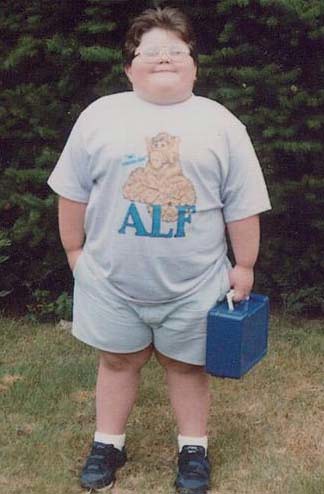
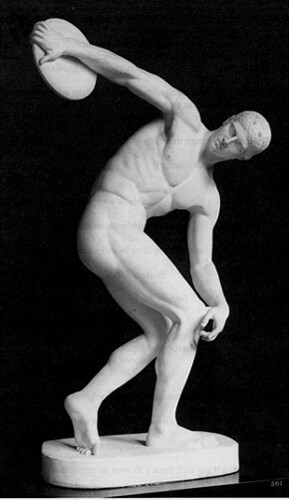

Wednesday, June 20, 2007
Any Tense You've Got
(Dedicated to all those regional news journalists who mix up their past, present and future tense, and just about everything else, with carefree abandon.)

NEWSREADER:
A time machine collided with a Melbourne house in rural Victoria tomorrow, and police are still counting the casualties. It is not known who was driving the time machine after the collision to cause the recent accident, but it is suspected that several people will shortly apply for the position. A pre-emptive inquiry is being prepared after the disaster at the moment under the supervision of Ms Merryn Cludge, Victorian Minister for Unlikely Disasters, who will shortly have these words to say to the media on the upcoming tragedy.
MERRYN CLUDGE:
We are deeply, deeply sorry for the victims of this tragedy that is shortly to unfold, and I promise all Victorians that the inquiry that we have recently held into this tragedy will determine as far as is possible what will be the cause of this dreadful, dreadful accident. Hopefully, we will learn from the mistakes that we are yet to make in order to make sure that this inevitable disaster will not have happened ever again.
NEWSREADER:
Meanwhile, a small funeral service held a week ago was attended well by several of the families of the victims of the upcoming Time Machine accident, as well as the victims themselves. If people believe that they or a family member or loved one will be involved in this upcoming accident, they will be contacted by a representative of the disaster hotline shortly, from this number: 1300 030 303.

NEWSREADER:
A time machine collided with a Melbourne house in rural Victoria tomorrow, and police are still counting the casualties. It is not known who was driving the time machine after the collision to cause the recent accident, but it is suspected that several people will shortly apply for the position. A pre-emptive inquiry is being prepared after the disaster at the moment under the supervision of Ms Merryn Cludge, Victorian Minister for Unlikely Disasters, who will shortly have these words to say to the media on the upcoming tragedy.
MERRYN CLUDGE:
We are deeply, deeply sorry for the victims of this tragedy that is shortly to unfold, and I promise all Victorians that the inquiry that we have recently held into this tragedy will determine as far as is possible what will be the cause of this dreadful, dreadful accident. Hopefully, we will learn from the mistakes that we are yet to make in order to make sure that this inevitable disaster will not have happened ever again.
NEWSREADER:
Meanwhile, a small funeral service held a week ago was attended well by several of the families of the victims of the upcoming Time Machine accident, as well as the victims themselves. If people believe that they or a family member or loved one will be involved in this upcoming accident, they will be contacted by a representative of the disaster hotline shortly, from this number: 1300 030 303.
Tuesday, June 19, 2007
Fashion! Religion! Bad puns!
The Marauding Muslins!
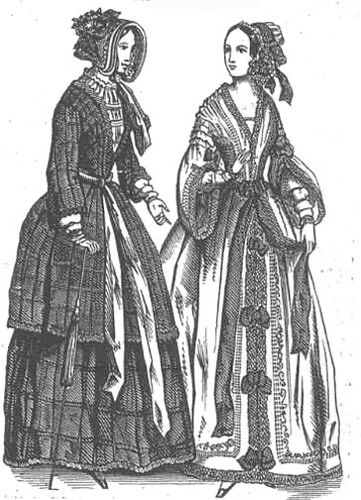
The Perfidious Shoes!

Bearers of the Cross, or cross bearers?
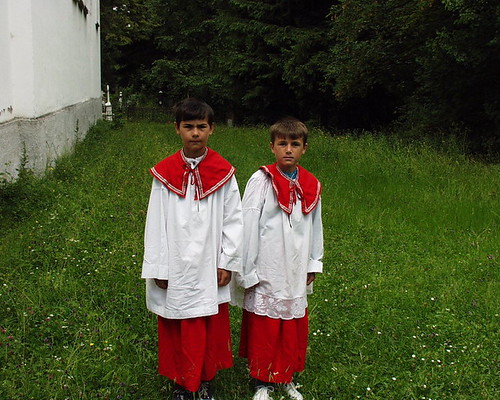
The Dread Guard!


The Perfidious Shoes!

Bearers of the Cross, or cross bearers?

The Dread Guard!

Sunday, June 17, 2007
Extra! Extra!
David Cameron has defended his call for more understanding of why young people commit crime - and rejected suggestions he wants people to "hug a hoodie". - BBC News.

A City Out Of Control
LONDON, SATURDAY - Citizens have been complaining in increasing numbers about gangs of rampaging Tories roaming the parks, looking for hoodies to hug.
Things have got so bad that the hoodies have been fleeing from their natural habitats, the parks, and are staying at home, leaving the Tories to gang up on ordinary citizens.
"I was just on my way to work" sobs one, "when I was confronted by a bunch of overaffectionate Tories who demanded in the nicest way possible that would it be alright, really, if they all gave me a hug? And then they insisted I have a cup of tea with them, if I really didn't mind! It was terrible!"
Meanwhile, the Amalgamated Hoodies' Union of Greater London and Surrounding Counties has petitioned the City of London to do something about the growing Tory problem so they can return to their normal crime-abiding ways.

Angry Scenes in Parliament
Tories have been confronted by Labor in Parliament over their controversial "hug a hoodie" policy.
"What's wrong with hugging a hoodie?" says one Tory Minister. "I mean, really. They're soft and cuddly and oh so lovely. I bet Mr Blair never got hugged when he was a kid. That's his problem."
However, a rival faction of Tories, led by former Spectator editor Boris Johnson, have claimed that Cameron's hoodie speech has been 'misinterpreted'.
"He really meant to say we should kiss a hoodie." said Johnson in a statement to the media.
Hoodies Break Down
Meanwhile, several hoodies, unable to take the new Tory hugging policy, have broken down already, causing widespread social concern.
"I just want things to go back to the way before!" sobs one hoodie. "I mean, they'd lash at us with their riding crops, we'd smash them in the face with broken bottles, they'd call us scum and dogs, we'd call them c*ts - things were so much easier then!"
A deputation of Labor supporters, concerned for the hoodies welfare, have promised to step in and lash the hoodies with riding crops and whips. However, they have called for a new social agency to be set up to provide this vital service to hoodies.

A City Out Of Control
LONDON, SATURDAY - Citizens have been complaining in increasing numbers about gangs of rampaging Tories roaming the parks, looking for hoodies to hug.
Things have got so bad that the hoodies have been fleeing from their natural habitats, the parks, and are staying at home, leaving the Tories to gang up on ordinary citizens.
"I was just on my way to work" sobs one, "when I was confronted by a bunch of overaffectionate Tories who demanded in the nicest way possible that would it be alright, really, if they all gave me a hug? And then they insisted I have a cup of tea with them, if I really didn't mind! It was terrible!"
Meanwhile, the Amalgamated Hoodies' Union of Greater London and Surrounding Counties has petitioned the City of London to do something about the growing Tory problem so they can return to their normal crime-abiding ways.

Angry Scenes in Parliament
Tories have been confronted by Labor in Parliament over their controversial "hug a hoodie" policy.
"What's wrong with hugging a hoodie?" says one Tory Minister. "I mean, really. They're soft and cuddly and oh so lovely. I bet Mr Blair never got hugged when he was a kid. That's his problem."
However, a rival faction of Tories, led by former Spectator editor Boris Johnson, have claimed that Cameron's hoodie speech has been 'misinterpreted'.
"He really meant to say we should kiss a hoodie." said Johnson in a statement to the media.
Hoodies Break Down
Meanwhile, several hoodies, unable to take the new Tory hugging policy, have broken down already, causing widespread social concern.
"I just want things to go back to the way before!" sobs one hoodie. "I mean, they'd lash at us with their riding crops, we'd smash them in the face with broken bottles, they'd call us scum and dogs, we'd call them c*ts - things were so much easier then!"
A deputation of Labor supporters, concerned for the hoodies welfare, have promised to step in and lash the hoodies with riding crops and whips. However, they have called for a new social agency to be set up to provide this vital service to hoodies.
Saturday, June 16, 2007
Review: Jonathan Strange and Mr Norrell
If you met somebody who was able to imitate Lucille Ball - acting as her television character from I Love Lucy - perfectly, you might think it was a good party trick. If you ran into a group of, say, fifty of them, you might think that they had all mistaken the trick for the party. You just might think they were a little nuts.
This is a ten-minute joke that's used in passing in 2001 film Rat Race, where one of the characters, marooned in the Arizona Desert somewhere, suddenly finds himself driving a bus full of Lucille Balls, including one male impersonator, all screaming and sobbing in the patented Lucy manner at every curve and pot hole in the road; pretty soon he's driven absolutely batty by them all.
In Jonathan Strange and Mr Norrell, a mock-19th century novel about magic, Sussana Clarke seems to be attempting a similar trick, by writing the novel in imitation Jane Austen. It's an odd affectation at first; she seems to have a fondness for using spellings such as 'sopha' or 'surprize' and dwelling upon country societies of magicians who don't practice magic at all. She is not evidently troubled by the lack of plot, unfolding the novel in as leisurely a pace as possible: one hundred and fifty pages in, probably no more than two or three significant plot events have taken place. One of the title characters, Jonathan Strange, is not introduced for two hundred pages!
This novel, you must understand, is eight hundred pages long. It looks impressive to carry around, and holds newspapers down in an even more impressive fashion, but after a while it begins to weigh on you. So by the time I'd conquered the first hundred pages, and discovered not a great deal of significance, I was beginning to go just a little batty.
But in a way, the leisurely pace of the 19th century novel, or a 19th-century style novel, anyway, has its own pleasures, and I persevered for the sheer pleasure of the prose. As it turned out, the Austen-like language was just the first in a series of tricks that Susanna Clarke pulls on her readers; as the novel slowly unfolded, so in came a whole host of other characters. May Ms Clarke present: acerbic, unliked, kindly, forty-one, fat, unmarried and, worst of all, progressive Sir Walter Pole, the politician; Lady Pole, his sickly wife, perpetually ailing with a mysterious illness; Stephen Black, Sir Walter Pole's servant of African ancestry who becomes affected with Lady Pole's illness as a result, simply, of being in the wrong place at the right time; and, above all, the strange, bitter, contrary Mr Norrell, ambitious magician on the make in London, and his student and friend, Jonathan Strange. In a similar manner to these characters gradually being introduced to our imagination, so to do two fops of the unctuous and toadying kinds - the wolfish Mr Drawlight and his companion Lascelles - insinuate their way into Mr Norrell's presence, introducing him to London society.
Then there were the footnotes. Like hat- and coat-racks, colons, and square numbers, footnotes amuse me; the more detailed, the better. You get all the amusement of reading without the dreadful sense of responsibility you sometimes get halfway through, say, an eight-hundred page novel. They are the most pleasant sort of distraction. Anyway, Jonathan Strange and Mr Norrell had plenty of footnotes, and they I'll be dashed if they weren't both pleasant and distracting. They often concern the characters and their history, but as the magical plot develop, they describe minor points of magical history, or give us long folk-stories about magic rings, or reference various acts of magic by the characters, or describe some historical context for the actions of the characters. The Austen-like voice suddenly becomes the voice of a nameless historical and biographical researcher into the lives of the characters.
The plot is something like this: after causing of the break up of a Yorkshire society of magicians, Mr Norrell decides that he is undoubtedly the Greatest Magician of the Age, and hurries to London to press his advantage amongst London society. At first he has no success, but then hearing that a prominent character's new wife has just died - a wife who was to help that character pay off a large family debt - he determines to raise the wife from the dead. He performs this act by doing an unsavoury deal with a supernatural creature who, for the rest of the novels, proceeds to insinuate himself into the lives of the other characters in cruel, although not deliberately malicious, ways. The ambition of Norrell is therefore satisfied but is also the cause of much of the disasters that are to befall characters in later chapters.
All this is related by the nameless historian in a cool, sardonic tone, as if he or she were relating a country novel of manners. Things change somewhat with the introduction of Jonathan Strange into the novel; by the middle of the second volume, he finds himself on the continent amidst the Napoleonic wars, and performs a series of increasingly bizarre magical tricks on the French at the bequest of Lord Wellington. The novel reaches absurd heights with successive accounts of rivers, mountains, and towns which have been moved by Strange in order to assist Lord Wellington, all neatly footnoted and explained by the chronicler in a simple, matter of fact manner.
And if, at these moments, the book reads more like an account of wonders and miracles - perhaps most like medieval texts and histories - the text has a muted and mournful force of its own when it describes the wretched lives of the characters who have been kidnapped by fairies. Gigantic houses with empty halls are described, and vast stone bridges, and glittering balls that never stop. One of the characters, Arabella Strange, says:
But it seems to me that the artist loves buildings and blue skies more than people. He has made them so small, so insignificant! Among so many marble palaces and bridges they seem almost lost. Do you not think so?'
The conversation holds more significance than she knows. So, you see, I gradually became accustomed to the tricks that Clarke pulled on her readers, and grew to enjoy them, though not quite expecting all of them. In the end, I didn't mind the fact that she pulled fast ones on me, just the fact that the fast ones tended to last two hundred pages!
Browsing around on the net afterwards, I found two reviews which seemed to criticise Clarke for the 19th-century-style prose. Actually, with some reservations, I think Clarke's prose was magnificently handled, with the exception of the last hundred pages when events rapidly fall over one another and she enters, rather too enthusiastically, into the minds of her characters. Her intent is obviously to move from a detached, objective novel to a more involved, stream-of-consciousness style novel, though things just get crazy in a couple of chapters towards the end. It's not the imitation Jane Austen that baulks - Austen was perfectly able to convey character and plot development in a few short lines - it's the imitation Tolkien.
Jonathan Strange and Mr Norrell: a damn good book, even if it took some time to get going!
This is a ten-minute joke that's used in passing in 2001 film Rat Race, where one of the characters, marooned in the Arizona Desert somewhere, suddenly finds himself driving a bus full of Lucille Balls, including one male impersonator, all screaming and sobbing in the patented Lucy manner at every curve and pot hole in the road; pretty soon he's driven absolutely batty by them all.
In Jonathan Strange and Mr Norrell, a mock-19th century novel about magic, Sussana Clarke seems to be attempting a similar trick, by writing the novel in imitation Jane Austen. It's an odd affectation at first; she seems to have a fondness for using spellings such as 'sopha' or 'surprize' and dwelling upon country societies of magicians who don't practice magic at all. She is not evidently troubled by the lack of plot, unfolding the novel in as leisurely a pace as possible: one hundred and fifty pages in, probably no more than two or three significant plot events have taken place. One of the title characters, Jonathan Strange, is not introduced for two hundred pages!
This novel, you must understand, is eight hundred pages long. It looks impressive to carry around, and holds newspapers down in an even more impressive fashion, but after a while it begins to weigh on you. So by the time I'd conquered the first hundred pages, and discovered not a great deal of significance, I was beginning to go just a little batty.
But in a way, the leisurely pace of the 19th century novel, or a 19th-century style novel, anyway, has its own pleasures, and I persevered for the sheer pleasure of the prose. As it turned out, the Austen-like language was just the first in a series of tricks that Susanna Clarke pulls on her readers; as the novel slowly unfolded, so in came a whole host of other characters. May Ms Clarke present: acerbic, unliked, kindly, forty-one, fat, unmarried and, worst of all, progressive Sir Walter Pole, the politician; Lady Pole, his sickly wife, perpetually ailing with a mysterious illness; Stephen Black, Sir Walter Pole's servant of African ancestry who becomes affected with Lady Pole's illness as a result, simply, of being in the wrong place at the right time; and, above all, the strange, bitter, contrary Mr Norrell, ambitious magician on the make in London, and his student and friend, Jonathan Strange. In a similar manner to these characters gradually being introduced to our imagination, so to do two fops of the unctuous and toadying kinds - the wolfish Mr Drawlight and his companion Lascelles - insinuate their way into Mr Norrell's presence, introducing him to London society.
Then there were the footnotes. Like hat- and coat-racks, colons, and square numbers, footnotes amuse me; the more detailed, the better. You get all the amusement of reading without the dreadful sense of responsibility you sometimes get halfway through, say, an eight-hundred page novel. They are the most pleasant sort of distraction. Anyway, Jonathan Strange and Mr Norrell had plenty of footnotes, and they I'll be dashed if they weren't both pleasant and distracting. They often concern the characters and their history, but as the magical plot develop, they describe minor points of magical history, or give us long folk-stories about magic rings, or reference various acts of magic by the characters, or describe some historical context for the actions of the characters. The Austen-like voice suddenly becomes the voice of a nameless historical and biographical researcher into the lives of the characters.
The plot is something like this: after causing of the break up of a Yorkshire society of magicians, Mr Norrell decides that he is undoubtedly the Greatest Magician of the Age, and hurries to London to press his advantage amongst London society. At first he has no success, but then hearing that a prominent character's new wife has just died - a wife who was to help that character pay off a large family debt - he determines to raise the wife from the dead. He performs this act by doing an unsavoury deal with a supernatural creature who, for the rest of the novels, proceeds to insinuate himself into the lives of the other characters in cruel, although not deliberately malicious, ways. The ambition of Norrell is therefore satisfied but is also the cause of much of the disasters that are to befall characters in later chapters.
All this is related by the nameless historian in a cool, sardonic tone, as if he or she were relating a country novel of manners. Things change somewhat with the introduction of Jonathan Strange into the novel; by the middle of the second volume, he finds himself on the continent amidst the Napoleonic wars, and performs a series of increasingly bizarre magical tricks on the French at the bequest of Lord Wellington. The novel reaches absurd heights with successive accounts of rivers, mountains, and towns which have been moved by Strange in order to assist Lord Wellington, all neatly footnoted and explained by the chronicler in a simple, matter of fact manner.
And if, at these moments, the book reads more like an account of wonders and miracles - perhaps most like medieval texts and histories - the text has a muted and mournful force of its own when it describes the wretched lives of the characters who have been kidnapped by fairies. Gigantic houses with empty halls are described, and vast stone bridges, and glittering balls that never stop. One of the characters, Arabella Strange, says:
But it seems to me that the artist loves buildings and blue skies more than people. He has made them so small, so insignificant! Among so many marble palaces and bridges they seem almost lost. Do you not think so?'
The conversation holds more significance than she knows. So, you see, I gradually became accustomed to the tricks that Clarke pulled on her readers, and grew to enjoy them, though not quite expecting all of them. In the end, I didn't mind the fact that she pulled fast ones on me, just the fact that the fast ones tended to last two hundred pages!
***
Browsing around on the net afterwards, I found two reviews which seemed to criticise Clarke for the 19th-century-style prose. Actually, with some reservations, I think Clarke's prose was magnificently handled, with the exception of the last hundred pages when events rapidly fall over one another and she enters, rather too enthusiastically, into the minds of her characters. Her intent is obviously to move from a detached, objective novel to a more involved, stream-of-consciousness style novel, though things just get crazy in a couple of chapters towards the end. It's not the imitation Jane Austen that baulks - Austen was perfectly able to convey character and plot development in a few short lines - it's the imitation Tolkien.
***
Jonathan Strange and Mr Norrell: a damn good book, even if it took some time to get going!
History Segment!
Russia, circa 1950: thousands of eager tradesmen rushed to become plumbers after first hearing the thrilling tones of the SONG OF THE UNITED PLUMBERS UNION OF THE USSR, which I am pleased to present to you today!
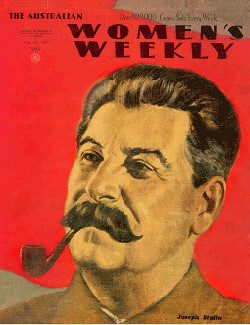
VERSE:
Plumb fiercely, plumbers,
Plumb, plumb, plumb!
Smash the capitalist menace
With your taps and pipes!
CHORUS:
Plumb, plumb, plumb:
Boldly brave the scum.
Plumb, plumb, plumb:
Plumbers - hoorah!
VERSE:
Plumb fiercely, plumbers
Serve the workers
With the astounding efficiency
Of your hot-water system!
CHORUS:
Plumb, plumb, plumb: (etc).
VERSE:
Plumb fiercely, plumbers:
Plumb, plumb, plumb!
Impress Comrade Stalin
And you will be richly rewarded
With your uranium-heated bathtub
For your old age!
Plumb! Plumb! Plumb!
By jove! Anyone else want a uranium-heated bathtub? Sign me up, Stalin!

VERSE:
Plumb fiercely, plumbers,
Plumb, plumb, plumb!
Smash the capitalist menace
With your taps and pipes!
CHORUS:
Plumb, plumb, plumb:
Boldly brave the scum.
Plumb, plumb, plumb:
Plumbers - hoorah!
VERSE:
Plumb fiercely, plumbers
Serve the workers
With the astounding efficiency
Of your hot-water system!
CHORUS:
Plumb, plumb, plumb: (etc).
VERSE:
Plumb fiercely, plumbers:
Plumb, plumb, plumb!
Impress Comrade Stalin
And you will be richly rewarded
With your uranium-heated bathtub
For your old age!
Plumb! Plumb! Plumb!
By jove! Anyone else want a uranium-heated bathtub? Sign me up, Stalin!
Friday, June 15, 2007
They Don't Write Books Like They Used To...
I got to talking to S. at work yesterday about some of the classic Australian books for children, like Blinky Bill. They're books that usually get passed over when people talk about Australian literature, or commemorated with a wide range of cutesy-images.

I don't know whether you could call this image cutesy, though!
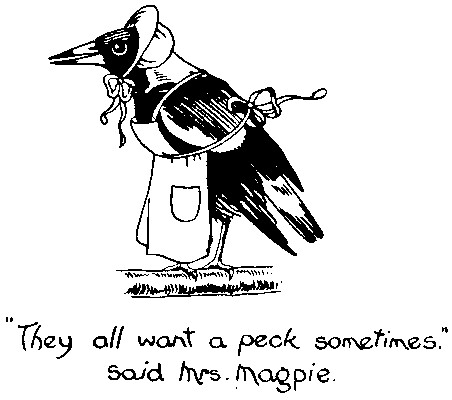
I read Blinky Bill once, perhaps twice when I was a kid, and the cutesy images aren't really what I remember. I think I identified with the Blinky character, who was usually getting into scrapes and/or trouble. They were very witty, too - the one line I remember from Blinky Bill is the comment Blinky makes when a friend loses his shoes: 'His feet have just dropped off.'
This one that I found yesterday just about sums up the meaning of Blinky Bill for me - the combination of childish innocence and childish delight in things that are just a little bit off:
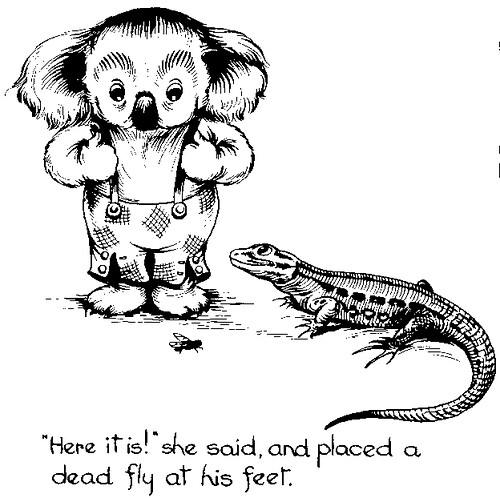
As a glance at these images, on Project Gutenberg, will show, the books were also full of odd fantasias, derring-do, pure evil, stern patriarchal figures, fun, pathos, delightful characters, chaos, greed, and shameless sadism. The Blinky Bill stories were written and illustrated by Dorothy Wall, evidently a lady of many talents. You can read all about Ms Wall and her talents here, but I think this illustration says more about her - and with more wit, too.
Norman Lindsay's famous illustrated book for children, The Magic Pudding, is probably just as iconic as Blinky Bill, (although I doubt that people outside Australia would know anything about either of them.) Like Blinky Bill, the book was about a peripatetic koala bear, 'Bunyip Bluegum', although the real star of the book was the Pudding. The Pudding was called Albert, walked, and spoke, but this wasn't what made it magic. Albert was magic because he* was a 'cut 'n' come again puddin''. Which meant you could keep on eating him, and he would never diminish in size.
Maybe this is what made him so cranky:
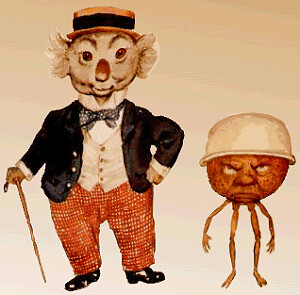
Clearly, this cantankerousness has had some impact on his later reputation in literature!
The Magic Pudding was a great book. It had adventure and humour aplenty, and at the end of every day, the characters would all sit around and eat Albert thoughtfully while digesting the events of the day. There were also plenty of songs and slapstick, making the book a wonderful, wonderful classic.
I also got a copy of Snugglepot and Cuddlepie when I was a kid. Written and illustrated by May Gibbs, the book was a story of 'gum-nut babies' who were always under threat of being kidnapped by those Banksia men. May Gibbs characters were mostly plants (albeit plants that talked and walked), but the stories stretched from land to the depths of the ocean: they were great!
I suppose you could make a case for these sort of stories about native animals and plants (or puddings) being given arms and legs and clothes as a kind of environmentalism. You know, the authors anthropomorphise wildlife because it's easier for us to sympathise with them that way. I enjoyed the adventures and romps the characters got into more than anything else (and, in the case of The Magic Pudding, the idea of eating one of the characters rather appealed to my ravenous child-self.)
There were other books, including Dot and the Kangaroo, which were later turned into a whole swathe of films that we were made to watch at school. Pre-eminent in the genre is perhaps Lindsay's The Magic Pudding, but there are plenty of other, similar books that have their place in the scheme of things.
I'd be rather curious about international equivalents to these books. When I was in the States, I picked up one of the Freddy books, about a clever pig who lives on a farm. I think it might be somewhere in Iowa.
*Albert is a boys name, though I'm not sure if gender distinctions apply to puddings...

I don't know whether you could call this image cutesy, though!

I read Blinky Bill once, perhaps twice when I was a kid, and the cutesy images aren't really what I remember. I think I identified with the Blinky character, who was usually getting into scrapes and/or trouble. They were very witty, too - the one line I remember from Blinky Bill is the comment Blinky makes when a friend loses his shoes: 'His feet have just dropped off.'
This one that I found yesterday just about sums up the meaning of Blinky Bill for me - the combination of childish innocence and childish delight in things that are just a little bit off:

As a glance at these images, on Project Gutenberg, will show, the books were also full of odd fantasias, derring-do, pure evil, stern patriarchal figures, fun, pathos, delightful characters, chaos, greed, and shameless sadism. The Blinky Bill stories were written and illustrated by Dorothy Wall, evidently a lady of many talents. You can read all about Ms Wall and her talents here, but I think this illustration says more about her - and with more wit, too.
Norman Lindsay's famous illustrated book for children, The Magic Pudding, is probably just as iconic as Blinky Bill, (although I doubt that people outside Australia would know anything about either of them.) Like Blinky Bill, the book was about a peripatetic koala bear, 'Bunyip Bluegum', although the real star of the book was the Pudding. The Pudding was called Albert, walked, and spoke, but this wasn't what made it magic. Albert was magic because he* was a 'cut 'n' come again puddin''. Which meant you could keep on eating him, and he would never diminish in size.
Maybe this is what made him so cranky:

Clearly, this cantankerousness has had some impact on his later reputation in literature!
The Magic Pudding was a great book. It had adventure and humour aplenty, and at the end of every day, the characters would all sit around and eat Albert thoughtfully while digesting the events of the day. There were also plenty of songs and slapstick, making the book a wonderful, wonderful classic.
I also got a copy of Snugglepot and Cuddlepie when I was a kid. Written and illustrated by May Gibbs, the book was a story of 'gum-nut babies' who were always under threat of being kidnapped by those Banksia men. May Gibbs characters were mostly plants (albeit plants that talked and walked), but the stories stretched from land to the depths of the ocean: they were great!
I suppose you could make a case for these sort of stories about native animals and plants (or puddings) being given arms and legs and clothes as a kind of environmentalism. You know, the authors anthropomorphise wildlife because it's easier for us to sympathise with them that way. I enjoyed the adventures and romps the characters got into more than anything else (and, in the case of The Magic Pudding, the idea of eating one of the characters rather appealed to my ravenous child-self.)
There were other books, including Dot and the Kangaroo, which were later turned into a whole swathe of films that we were made to watch at school. Pre-eminent in the genre is perhaps Lindsay's The Magic Pudding, but there are plenty of other, similar books that have their place in the scheme of things.
I'd be rather curious about international equivalents to these books. When I was in the States, I picked up one of the Freddy books, about a clever pig who lives on a farm. I think it might be somewhere in Iowa.
*Albert is a boys name, though I'm not sure if gender distinctions apply to puddings...
Wednesday, June 13, 2007
Tuesday, June 12, 2007
Please Do Not Apply
I had a great long weekend, taking the time to watch two films, one play, stay up late watching Rage, reading two hundred pages or so of this doorstop of a novel I have on the go, and finally - begrudgingly - cleaning the house. Rather depressing to get back to work, really.
Anyway, when I got home from work this evening, my flatmate was going through the job advertisements from the weekend paper. Job advertisements! I've been through more than a few of those in my time. There are the hospitality ones that millions of teenagers end up applying for, and the Government ones with ridiculously specific job descriptions, for which you just know they've already earmarked someone. There are the ones looking for people with 'secretarial skills' and 'problem solving abilities' that are unintentionally riddled with misplaced punctuation and incorrect spelling. And I'm sure there were some positions advertised for which the applicants would make the application, be asked in for an interview, and end up sitting in an office filling in another application form: applying in order to be considered for another application, in fact. (I've been through a couple of job interviews like this).
And then, there was the one my flatmate spotted: 'We are only looking for applications from scientists'. Christ, what sort of applicants had they had before? "Hello - I'd like to apply for the position of sub-atomic physicist, specialising in the field of Charmed Quarks and behaviour of Leptons! I haven't had any experience or training as a scientist, so called - but I have a proven ability to learn new skills on my feet, excellent references, and Strong Communication Skills!"
Just for once, I'd like to see a job ad like this:
NOPE. YOU'RE ALL SHIT. PLEASE FUCK OFF.
Clear message, unambigous message, and it really weeds out all the time wasters and applicants who lack experience or adequate training for the position. Should do the trick nicely.
Anyway, when I got home from work this evening, my flatmate was going through the job advertisements from the weekend paper. Job advertisements! I've been through more than a few of those in my time. There are the hospitality ones that millions of teenagers end up applying for, and the Government ones with ridiculously specific job descriptions, for which you just know they've already earmarked someone. There are the ones looking for people with 'secretarial skills' and 'problem solving abilities' that are unintentionally riddled with misplaced punctuation and incorrect spelling. And I'm sure there were some positions advertised for which the applicants would make the application, be asked in for an interview, and end up sitting in an office filling in another application form: applying in order to be considered for another application, in fact. (I've been through a couple of job interviews like this).
And then, there was the one my flatmate spotted: 'We are only looking for applications from scientists'. Christ, what sort of applicants had they had before? "Hello - I'd like to apply for the position of sub-atomic physicist, specialising in the field of Charmed Quarks and behaviour of Leptons! I haven't had any experience or training as a scientist, so called - but I have a proven ability to learn new skills on my feet, excellent references, and Strong Communication Skills!"
Just for once, I'd like to see a job ad like this:
NOPE. YOU'RE ALL SHIT. PLEASE FUCK OFF.
Clear message, unambigous message, and it really weeds out all the time wasters and applicants who lack experience or adequate training for the position. Should do the trick nicely.
An Announcement...
Anybody notice anything about the previous four posts?
That's right: one of them has 16 comments. The one before that has 25 comments. The one before that, 9 comments; and the one before that? Four comments! They're all square numbers!
I am immoderately excited by this!
UPDATE! - This post now has 1 comment: another square number! Hooray for Karen!
UPDATE UPDATE! - In case you've been wondering why I haven't commented myself, this is why.
Often, as my eye rests upon a square-numbered comment box, I think to myself, 'If only it could be this way forever!'
Simple things like this entertain me. I also like colons (of the grammatical type) and hat racks. I once told a completely dull story about a hat rack in New York to Alexis and was bemused when she did not share my excitement.
UPDATE UPDATE UPDATE! - Naturally, this would be the perfect opportunity for a nasty person to leave one comment each in all of the posts below, thus ruining this moment. I trust this nasty person will exercise restraint and forebear from performing this perfidious act.
That's right: one of them has 16 comments. The one before that has 25 comments. The one before that, 9 comments; and the one before that? Four comments! They're all square numbers!
I am immoderately excited by this!
UPDATE! - This post now has 1 comment: another square number! Hooray for Karen!
UPDATE UPDATE! - In case you've been wondering why I haven't commented myself, this is why.
Often, as my eye rests upon a square-numbered comment box, I think to myself, 'If only it could be this way forever!'
Simple things like this entertain me. I also like colons (of the grammatical type) and hat racks. I once told a completely dull story about a hat rack in New York to Alexis and was bemused when she did not share my excitement.
UPDATE UPDATE UPDATE! - Naturally, this would be the perfect opportunity for a nasty person to leave one comment each in all of the posts below, thus ruining this moment. I trust this nasty person will exercise restraint and forebear from performing this perfidious act.
Monday, June 11, 2007
An Afterthought...
When I start posting entire operas on my blog, could be I need to find some other medium of publication...
No, no, I'm not giving up blogging or anything like that. But operas - even if they are operas about tea - sort of go beyond the limits of what blogger can achieve.
I think I might try to find me a theatre group, as well as some paying publication that will give me big dollars for some of the weird stuff that I keep coming up with here. Any suggestions, anyone?
No, no, I'm not giving up blogging or anything like that. But operas - even if they are operas about tea - sort of go beyond the limits of what blogger can achieve.
I think I might try to find me a theatre group, as well as some paying publication that will give me big dollars for some of the weird stuff that I keep coming up with here. Any suggestions, anyone?
Too Twee for Two
'I never liked opera. You have two characters singing 'would you like a cup of tea' to one another.' - Tabitha Katt.
Well, that's true, there is something ridiculous about opera at the best of times. But I've never let the ridiculous stop me before; and as I get older, I seem to get more ridiculous. Anyway, Tabitha Katt's wise observation stuck with me, and in due course, I produced an opera about just this situation. I present it now as a Queen's birthday entertainment for your delectation.

The CUP of TEA,
An impossible opera in one scene and ten acts, for Soprano, Tenor, and Chorus, ranging from the Low C to the High Ts. (I told you it was impossible).
The curtains open on a living room. A man and a woman - imaginatively titled 'HE' and 'SHE' - are seated on chairs in the living room wearing whatever damn thing the costume designer tells them to wear. Don't ask me. SHE stands and says to the man:
SHE: Would you like a cup of tea?
HE: (Leaping from his seat with great alacrity) What's that you say? Tea? Tea? Tea?
(Sings)
PATTER SONG
TEA! The nectar of the Gods!
TEA! This beautiful ambrosia!
TEA! When I drink it, then I think
The world seems rosier!
TEA! The cup that soothes, calms, and relaxes!
TEA! It makes life seem cosier!
TEA! It never costs you, never taxes -
Yes TEA, TEA, TEA!
SHE: Well, good. Because I've put the kettle on.
HE: She's put the kettle on!
She's put the throttle on!
She's put that little bit of metal on
That little piece of stove - with love!
Oh God above!
It will be just a little while longer,
It will be sooner than you think!
Just a little while until we've run the mile
And get the drink!
Oh heavens, Help!
But what if that steaming piece of metal
Causes the stove to catch fire?
What if the oven explodes? And burns our abode?
The fate could be dire!
Oh thing from hell!
SIX-PART FUGUE (or, if the two singers can't manage that on their own, a FOUR-PART FUGUE with the other parts to be equally divided out amongst the audience - they can do with it as they see fit.)
HE: I'm sorry - I don't know what came over tea... er, that is, me!
SHE: I'll just see how it is.
(Goes into the kitchen)
HE: Oh. Fair enough.
(Sings)
ARIA
I once was young and happy,
With dimples and with curls,
Just a simple dimpled child,
Just a simple little ... guy
I frolicked through the tulips,
I lay down 'neath the trees,
I played my childish follies out between the hollies,
Wafted hither by a zephyr of a breeze...
(HE mimics this by skipping about the stage. Now a corner of the room lights up to show a gigantic landscape painting of a tree and a stream, which he approaches)
I think I'll lay my head
And dream
Besides this purling stream
And dream,
Of Caliphates
And Ottomans
And good old Araby...
(Turkish music)
Ah! What's that sound!
About, around,
Now lost, now found,
Now here, now there,
Now high, now low,
Now everywhere?
I see the Caliph of all Araby
Reclining on a purple lounge
With nymphs in veils
And peacock tails
Swirl around, around!
(As he sings, in a corner of the stage we see just what he is describing taking place. An opera just isn't the same thing without a couple of old stage stereotypes thrown in just for the hell of it.)
I see a smoking ewer,
Of myrrh and incense pure,
Waving hither,
Hither, thither,
Down, around, around!
(Enter incense wavers who spend the next few minutes wandering about the stage waving the incense around in one another's faces, banging one another on the head in a comically slapstick manner, and making general nuisances of themselves)
The Sultan takes, I see,
A steaming pot - of ivory!
He takes a creamy clot -
He drinks a lot -
It is quite hot - this tea!
(The Sultan pours himself some tea and drinks it withh the words of the song. I don't know what his cup should be made out of or shaped like. Something authentic, I guess, like an elephant tusk.)
But hark! What lurks!
Within the dark,
Within the murk?
Save me!
It is the Turks!
The Turkish guard
Have come, at last,
To take their meal,
And their repast:
To take their TEA!
(The Turkish Guards, who have been hanging around backstage since the last opera were getting bored, so I thought I'd throw them in there. They enter stage left, stage right, and every other possible way, all carrying small tea cups and tea pots. They are singing a TURKISH SONG. It is very complicated, as you will soon see.)
TURKISH SONG
TURKS: We are the Turks!
We are the Turks!
We are the Turks!
Huzzah! Huzzah!
We work! And we lurk!
In the dark! and the murk!
Nothing do we shirk!
Huzzah! Huzzah!
We are the Turks!
We are not Clerks!
But one of our perks -
Is TEA!
(They proceed to pour tea into their cups in a stylish fashion, dancing while they do it. Linking arms, they drink tea out of one another's cups. They do this several times to dance music.)
We are the Turks!
We are the Turks!
We are the Turks!
Huzzah!
Huzzah!
TURKISH LEADER: TURKS! ONE! TWO! THREE! FOUR!
TURKS: (In a Turkish accent) We drink tea when we fight a war!
TURKISH LEADER: TURKS! FIVE! SIX! SEVEN! EIGHT!
TURKS: Tea is lovely! Tea is great!
ALL: We are the Turks!
We are the Turks!
We are the Turks!
Huzzah!
(They all leave by doing a complicated march/dance around HE, who is rather perplexed and bedazzled by all these shenanigans.)
HE: It is but a dream I have
Sometimes, it seems I have...
(He is interrupted by a high whistle. SHE walks from the kitchen bearing the the pot and cups.)
SHE: It's done! Would you like your tea with milk, or without?
HE: With or without? Without or with?
(Sings)
O, ye shades from hell
That do accurse me!
Now do my choices tell,
Advise, rehearse me!
I, that am torn betwixt
These two foul fates!
It's all there in black and white -
It's as clear as day and night -
I, that am torn betwixt
These two foul fates!
So do ye shades from hell
Know how to afflict me well
In my position!
O, GREAT GOD ABOVE, do help me now
In my indecision!
(Clasping his hands together and looking to the heavens)
DUET
HE: White or black? Black or white?
With or without?
O, ye foul fiends of hell
That do accurse me!
(Turns, trembling, to her. She weeps in his hands briefly before facing her, and saying in a tremulous voice...)
HE: Er... white, please.
SHE: (Pours him a glass) There you go!
HE: (Falls to the ground in a faint) Ah!
SHE: This always happens! (She stoops to revive him. Once he is awakened, she gives him the tea.)
HE: (Sipping) Not bad! Not bad at all!
(For the FINALE, the entire Turkish Guard enter onto stage, this time wearing can-can outfits they borrowed from the cast of Ziegfield's Follies, or something. I don't know. They proceed to do an exuberant TEA DANCE while HE and SHE sit contendedly and sip at their respective cups of tea until the curtains fall).
Well, that's true, there is something ridiculous about opera at the best of times. But I've never let the ridiculous stop me before; and as I get older, I seem to get more ridiculous. Anyway, Tabitha Katt's wise observation stuck with me, and in due course, I produced an opera about just this situation. I present it now as a Queen's birthday entertainment for your delectation.

The CUP of TEA,
An impossible opera in one scene and ten acts, for Soprano, Tenor, and Chorus, ranging from the Low C to the High Ts. (I told you it was impossible).
The curtains open on a living room. A man and a woman - imaginatively titled 'HE' and 'SHE' - are seated on chairs in the living room wearing whatever damn thing the costume designer tells them to wear. Don't ask me. SHE stands and says to the man:
SHE: Would you like a cup of tea?
HE: (Leaping from his seat with great alacrity) What's that you say? Tea? Tea? Tea?
(Sings)
PATTER SONG
TEA! The nectar of the Gods!
TEA! This beautiful ambrosia!
TEA! When I drink it, then I think
The world seems rosier!
TEA! The cup that soothes, calms, and relaxes!
TEA! It makes life seem cosier!
TEA! It never costs you, never taxes -
Yes TEA, TEA, TEA!
SHE: Well, good. Because I've put the kettle on.
HE: She's put the kettle on!
She's put the throttle on!
She's put that little bit of metal on
That little piece of stove - with love!
Oh God above!
It will be just a little while longer,
It will be sooner than you think!
Just a little while until we've run the mile
And get the drink!
Oh heavens, Help!
But what if that steaming piece of metal
Causes the stove to catch fire?
What if the oven explodes? And burns our abode?
The fate could be dire!
Oh thing from hell!
SIX-PART FUGUE (or, if the two singers can't manage that on their own, a FOUR-PART FUGUE with the other parts to be equally divided out amongst the audience - they can do with it as they see fit.)
| HE: TEA! Thou foul demonic liquid! TEA! Thou thing of anguish and of pain! TEA! Thou serpent with a sweetened tongue - I'VE GOT TEA ON MY BRAIN! | SHE: Polly put the kettle on, Molly put the metal on, Holly put the throttle on - We'll all have tea! |
HE: I'm sorry - I don't know what came over tea... er, that is, me!
SHE: I'll just see how it is.
(Goes into the kitchen)
HE: Oh. Fair enough.
(Sings)
ARIA
I once was young and happy,
With dimples and with curls,
Just a simple dimpled child,
Just a simple little ... guy
I frolicked through the tulips,
I lay down 'neath the trees,
I played my childish follies out between the hollies,
Wafted hither by a zephyr of a breeze...
(HE mimics this by skipping about the stage. Now a corner of the room lights up to show a gigantic landscape painting of a tree and a stream, which he approaches)
I think I'll lay my head
And dream
Besides this purling stream
And dream,
Of Caliphates
And Ottomans
And good old Araby...
(Turkish music)
Ah! What's that sound!
About, around,
Now lost, now found,
Now here, now there,
Now high, now low,
Now everywhere?
I see the Caliph of all Araby
Reclining on a purple lounge
With nymphs in veils
And peacock tails
Swirl around, around!
(As he sings, in a corner of the stage we see just what he is describing taking place. An opera just isn't the same thing without a couple of old stage stereotypes thrown in just for the hell of it.)
I see a smoking ewer,
Of myrrh and incense pure,
Waving hither,
Hither, thither,
Down, around, around!
(Enter incense wavers who spend the next few minutes wandering about the stage waving the incense around in one another's faces, banging one another on the head in a comically slapstick manner, and making general nuisances of themselves)
The Sultan takes, I see,
A steaming pot - of ivory!
He takes a creamy clot -
He drinks a lot -
It is quite hot - this tea!
(The Sultan pours himself some tea and drinks it withh the words of the song. I don't know what his cup should be made out of or shaped like. Something authentic, I guess, like an elephant tusk.)
But hark! What lurks!
Within the dark,
Within the murk?
Save me!
It is the Turks!
The Turkish guard
Have come, at last,
To take their meal,
And their repast:
To take their TEA!
(The Turkish Guards, who have been hanging around backstage since the last opera were getting bored, so I thought I'd throw them in there. They enter stage left, stage right, and every other possible way, all carrying small tea cups and tea pots. They are singing a TURKISH SONG. It is very complicated, as you will soon see.)
TURKISH SONG
TURKS: We are the Turks!
We are the Turks!
We are the Turks!
Huzzah! Huzzah!
We work! And we lurk!
In the dark! and the murk!
Nothing do we shirk!
Huzzah! Huzzah!
We are the Turks!
We are not Clerks!
But one of our perks -
Is TEA!
(They proceed to pour tea into their cups in a stylish fashion, dancing while they do it. Linking arms, they drink tea out of one another's cups. They do this several times to dance music.)
We are the Turks!
We are the Turks!
We are the Turks!
Huzzah!
Huzzah!
TURKISH LEADER: TURKS! ONE! TWO! THREE! FOUR!
TURKS: (In a Turkish accent) We drink tea when we fight a war!
TURKISH LEADER: TURKS! FIVE! SIX! SEVEN! EIGHT!
TURKS: Tea is lovely! Tea is great!
ALL: We are the Turks!
We are the Turks!
We are the Turks!
Huzzah!
(They all leave by doing a complicated march/dance around HE, who is rather perplexed and bedazzled by all these shenanigans.)
HE: It is but a dream I have
Sometimes, it seems I have...
(He is interrupted by a high whistle. SHE walks from the kitchen bearing the the pot and cups.)
SHE: It's done! Would you like your tea with milk, or without?
HE: With or without? Without or with?
(Sings)
O, ye shades from hell
That do accurse me!
Now do my choices tell,
Advise, rehearse me!
I, that am torn betwixt
These two foul fates!
It's all there in black and white -
It's as clear as day and night -
I, that am torn betwixt
These two foul fates!
So do ye shades from hell
Know how to afflict me well
In my position!
O, GREAT GOD ABOVE, do help me now
In my indecision!
(Clasping his hands together and looking to the heavens)
DUET
| HE: To be, or not to be, It's just a cup of tea!, Can't she see? Won't she see? What it could mean to me? It's just a cup of tea! It's tea, tea, tea, tea, T-R-O-U-B-L-E! Trouble! Tea, tea, tea, tea, T-E-R-R-O-R! Thou little cup of terror! | SHE: It's ready! It's ready! Get it while it's hot! It's ready! It's ready! White or black, black or white? Get it while it's hot! It's ready! It's steady! Get it on the double! It's steady! It's ready! Get it while it's hot! It's ready! It's ready! Get it now - or not! |
HE: White or black? Black or white?
With or without?
O, ye foul fiends of hell
That do accurse me!
(Turns, trembling, to her. She weeps in his hands briefly before facing her, and saying in a tremulous voice...)
HE: Er... white, please.
SHE: (Pours him a glass) There you go!
HE: (Falls to the ground in a faint) Ah!
SHE: This always happens! (She stoops to revive him. Once he is awakened, she gives him the tea.)
HE: (Sipping) Not bad! Not bad at all!
(For the FINALE, the entire Turkish Guard enter onto stage, this time wearing can-can outfits they borrowed from the cast of Ziegfield's Follies, or something. I don't know. They proceed to do an exuberant TEA DANCE while HE and SHE sit contendedly and sip at their respective cups of tea until the curtains fall).
Sunday, June 10, 2007
If Magazine Subscribers Were Like Football Fanatics
Or, The Other, Other Contact Sport
BOB: Well, here we are again, Jerry, at the MCG, for another exciting match. This is shaping up to be an interesting season so far, don't you agree? And who have we got today?
JERRY: Yes Bob. It is. And today at the MCG, we've got two feisty visiting magazines squaring off against one another. Tory publication The Spectator, and their fierce contenders in the international magazine market, The New Statesman.
BOB: Old Tory versus new Socialist! As you can see, they've both got a huge fan base, and the crowd is going wild as we speak! But if you ask me, Jerry, I don't quite know if The Spectator have quite got it in them to bring the match to a successful conclusion tonight.
JERRY: Well, you would say that. We both know what your side is!
(Laughter)
JERRY: But no. Look. The line up is impressive. The Statesman have Darcus Howe, strong opinion columnist. They have a strong front line of journalists and internationally syndicated columnists.
BOB: Bit impersonal.
JERRY: But effective. They get the job done. Quirky humour columns, too, by Julian Clary - although his stand in this week is Marcus Brigstock...
BOB: Exactly. Strong all round. And The Spectator... well, I'm just not convinced by this shaggy line up of old school boys and girls. I mean, what have we got? Boris Johnson. Definite star. Good leader writer. Works well with his home crowd, not so much here. Rod Liddle, obviously. We have one or two moonlighting politicians - they make good column filler, but not much by way of depth. A strong book review section in defence...
JERRY: Oh, no-one's denying that. That's always been one of their strong points.
BOB: And what else?
JERRY: The food column.
BOB: The food column. By Deborah Ross.
JERRY: Yes. Who is this Ross person, anyway?
BOB: Does restaurant reviews. Moonlight's as a film reviewer occasionally. Bit of the funny stuff, with personal observations, if you like that sort of thing.
JERRY: Yes. But they're starting! And the New Statesman has taken the initiative brilliantly with a Leading article about immigration: and it's a goal!
BOB: Brilliant! Immigration's always a strong point with them, Bob...
***
THREE-QUARTERS LATER
THREE-QUARTERS LATER
JERRY: Well, Bob, the fourth quarter of the game has only just started, and what an amazing match it's been!
BOB: Yes. I've got to tell you, the calibre of the games pages for both of the magazines has been outstanding. A good line up of humourous mock-essays and parody poems. Both magazines have scored well with them.
JERRY: And Boris Johnson delivered spectacularly, as he always does, with a brilliantly-written headlined article about education. The opposition could counter some of his arguments, but they just couldn't find anything to tackle his sheer rhetorical force!
BOB: Yes. He scored big with that one. But they've still got to catch up after that amazing, just amazing series of goals made in Marcus Brigstocke's whimsical look at the Hay-on-Wye literary festival.
JERRY: The Statesman are tossing the arguments back and forth now. O'Neill. Millard. Bray. Millard again. The back-page reviews of the Statesman are trying to get a review through, but they're just not...
BOB: Oh, look at this! Ross! Deborah Ross has got the initiative, and she's just made a wonderful series of bon mots!
JERRY: Spectacular! I've never seen a better-executed restaurant review! And it's a goooooal!!!
BOB: Wonderful, wonderful! She's certainly been a surprise, Jerry.
JERRY: A star performer of the match, that's for sure. She's been a real winner for The Spectator.
BOB: Brigstocke. Rachael Cooke. The Statesman have just got to get another article through, and then, it's going to be hard for The Spectator to come back.
JERRY: They're not getting through at the moment. That book and theatre review section is rock-solid!
BOB: Oh, look at this!
JERRY: It's Jeremy Clarke - a definite star for The Spectator with his long-running 'Low Life' column! He's just made a great play, with several sly observations, his characteristic wit...
BOB: Oh My God!
JERRY: Marvellous! After a sneaky play with a few mordant asides, he's rounded off his article with a well-timed anecdote. And it's a SPLENDID goal!
BOB: Oh My God!
JERRY: They could win this, Bob!
BOB: Well, I've known a lot of columnists, but few quite so sharp as Clark, that's true.
JERRY: Look at this. It's Howe! Darcus Howe! Leading off with an incisive column about immigration and housing. They're in it to win it, this New Statesman crowd!
BOB: Bit dull, this guy, don't you think? He could be writing this for any two-bit newspaper like...
JERRY: But he gets the job done. HE SCORES!
BOB: Coming down to the final minutes, and it's neck and neck. The Spectator need just one more to catch up. But...
JERRY: Oh! Oh! It's Charles Moore, that dishevelled old ex-Telegraph editor, with his Spectator's Notes diary!
BOB: A sharp observation! Two witty personal reminiscences! And he's through!
JERRY: The Spectator has drawn level!
BOB: Can they bring it home, Jerry?
JERRY: The Statesman! They're angry, and on the attack! Now, they don't have that backlog of cartoonists like The Spectator used to such good effect earlier, but they're retaliating with a splending mock-drama by a comic writer known as 'Red Box'!
BOB: Oh, very nice!
JERRY: Very sharp. V-ERRRRRY SHARP! And it's a goal! They're ahead again!
BOB: But look at this, Jerry!
JERRY: It's Charles Moore! Again!
BOB: It seems there's even more life in his column, and he's on the attack: just full of witty observations!
JERRY: Oh, this is neat! He's quoting a Labour minister. And he finishes it off with a superbly erudite backhanded compliment.
BOB: He says "The non-sequitur in that last sentence is breathaking." And HE SCORES!
JERRY: Marvellous! But there's only a minute left!
BOB: Can they do it? The Spectator is raring to win!
JERRY: OH MY GOD! It's Deborah Ross again! And after that superb restaurant review triple Bon Mot play, she's back - with a film review!
BOB: Marvellous! An arch reference about Keira Knightley, a sly self-revealing quip about Jonny Dep, and a brilliant disparaging nickname for his co-star, Orlando...
JERRY: ROSS is on FIRE! The Statesman just can't stop her! And that's a goal! The Spectator is ahead! AND THAT'S THE SIREN! IT'S OVER!
BOB: THE SPECTATOR has just WON THE MATCH!
JERRY: A WIN FOR THE SPECTATOR!
BOB: Oh my GOD!
JERRY: And the Tories in the crowd are just going wild!
BOB: Bit over the top for them, don't you reckon?
JERRY: Give them their moment, Bob, give them their moment...
***
NEXT WEEK:
The mean team behind Viz Comics face off against the well-trained team behind The New Yorker. Who will be the winner?
The mean team behind Viz Comics face off against the well-trained team behind The New Yorker. Who will be the winner?
Saturday, June 09, 2007
For my next trick...
A comprehensive, uncondensed summary of the sciences into one bite-sized limerick.
Containing special reference to physics, economics, cosmology, psychology, psychiatry, the medical sciences, philosophy, and evolutionary biology.
Strange Quarks are quirky quarks,
Hayek is anti-Marx,
Black holes are black,
Freud sniffed some crack,
And Heidegger and Darwin are weird guys who hang out in parks.
Have a great weekend, people.
Containing special reference to physics, economics, cosmology, psychology, psychiatry, the medical sciences, philosophy, and evolutionary biology.
Strange Quarks are quirky quarks,
Hayek is anti-Marx,
Black holes are black,
Freud sniffed some crack,
And Heidegger and Darwin are weird guys who hang out in parks.
Have a great weekend, people.
Friday, June 08, 2007
Tennis? It's All A Load of Balls, Really...
My belief that most sports journalists are failed poets was sustained by a brief glance at the results of the French Open women's singles this year.
Good grief, what a load of bollocks that is. I think I can say it all much more succintly. Let's see...
Good grief, what a load of bollocks that is. I think I can say it all much more succintly. Let's see...
DAY 1
Williams beats Pironkova;
Henin, Vesnina;
Paszek trumps Nakamura,
And HOORAY for Safina!
DAY 2
Williams beats Cornet
6/4, 6/3;
Stosur beats Jackson:
PLUS: A win to Na Li!
DAY 3
Bartoli - Gagliardi -
And Vaidisova;
Not to mention Parmentier -
And Algul Amanmuradova!
DAY 4
For (RUS): SHARAPOVA!
For (NED): Krajicek;
Mathilde plays for (FRA)
And there's Peschke: the Czech.
DAY 5
Wins go to Williams,
Peer, Sugiyama - but it's
Curtains for Shaughnessy
And Gallovits.
DAY 6
Hooray for Williams!
6/2, 6/3
Also: Bammer the Rammer
Thrashes Na Li!
DAY 7
SHARAPOVA! Safarova!
Olaru! Cibulkova!
Chakvetadze! Kuznetsova!
Kudryavtseva! Knapp!
DAY 8
1/6, 1/6 -
Straight sets to Jankovic:
But it's more of a fight
For Ana Ivanovic.
DAY 10
Quarter finals! Exciting!
Wins to Henin! SHARAPOVA!
(Bad luck to the others -
Such as Vaidisova!)
DAY 12
Oh no! Oh my God!
Just let it be over!
Henin beats Jankovic,
Ivanovic beats SHARAPOVA!
THE FINAL: COMING UP NEXT!
Will Henin beat Ivanovic,
Or vice versa?
Here's an ad for a deodorant
Worn by Sam Stosur!
Williams beats Pironkova;
Henin, Vesnina;
Paszek trumps Nakamura,
And HOORAY for Safina!
DAY 2
Williams beats Cornet
6/4, 6/3;
Stosur beats Jackson:
PLUS: A win to Na Li!
DAY 3
Bartoli - Gagliardi -
And Vaidisova;
Not to mention Parmentier -
And Algul Amanmuradova!
DAY 4
For (RUS): SHARAPOVA!
For (NED): Krajicek;
Mathilde plays for (FRA)
And there's Peschke: the Czech.
DAY 5
Wins go to Williams,
Peer, Sugiyama - but it's
Curtains for Shaughnessy
And Gallovits.
DAY 6
Hooray for Williams!
6/2, 6/3
Also: Bammer the Rammer
Thrashes Na Li!
DAY 7
SHARAPOVA! Safarova!
Olaru! Cibulkova!
Chakvetadze! Kuznetsova!
Kudryavtseva! Knapp!
DAY 8
1/6, 1/6 -
Straight sets to Jankovic:
But it's more of a fight
For Ana Ivanovic.
DAY 10
Quarter finals! Exciting!
Wins to Henin! SHARAPOVA!
(Bad luck to the others -
Such as Vaidisova!)
DAY 12
Oh no! Oh my God!
Just let it be over!
Henin beats Jankovic,
Ivanovic beats SHARAPOVA!
THE FINAL: COMING UP NEXT!
Will Henin beat Ivanovic,
Or vice versa?
Here's an ad for a deodorant
Worn by Sam Stosur!
Wednesday, June 06, 2007
Six Word Phrases You May Not Want To Hear
I'm sorry, your cock is busted.UPDATE: A Six Word Phrase You May Want To Hear
You've just eaten my pet koala!
I married your twin sister mistakenly.
Your testicles are going to explode!
I'm Satan, nice to eat you!
What time was the apocalypse again?
Watch out for the falling elephants...
We're your new neighbours! We're Morm...
We're your new neighbours! We're Commun...
We're your new neighbours! We're dieti...
Hello! Misanthropics Anonymous? Yes! Welcome, friend!
The Sociopath Society? No - we're socialists...
Welcome to Accountancy One Oh One...
You are a cat person, obviously...
Congratulations! You've just conceived Adolf Hitler...
Collingwood have won the Grand Final!
Your duck has lost its quack.
Yes! Yes! Yes! Yes! Yes! Wait!
Tomorrow and tomorrow... what comes next?
Oh dear. Speaking to yourself again.
You're a virgin, I'm a nymphomaniac...
Tuesday, June 05, 2007
Tales From Earthsea
Saw Tales from Earthsea last night. Leigh Paatsch of the Herald Sun trashed the film in his review on Thursday: gave it only one star.

Bollocks to that. It was great, best film I've seen for a while. Anything that starts with a storm at sea and two dragons fighting, has a murder two scenes after that, a kid being chased down by ravening wolves in the scene after that, not to mention well developed characters and an otherwise awesome plot has got to be good.
Critics: 0
Ursula le Guin/Japanese Manga: 1

Bollocks to that. It was great, best film I've seen for a while. Anything that starts with a storm at sea and two dragons fighting, has a murder two scenes after that, a kid being chased down by ravening wolves in the scene after that, not to mention well developed characters and an otherwise awesome plot has got to be good.
Critics: 0
Ursula le Guin/Japanese Manga: 1
A Band Called Rubber
A friend of my flatmates came around here the other day and started talking about 'the music of My Friend the Chocolate Cake', and I thought, bloody hell! Is that how bad things have got?
It started innocently enough when bands were just named after the people who ran them. Dave Brubeck, Miles Davis, that sort of thing. Maybe the rot started to set in with rock'n'roll: there was nothing particularly cometary about Bill Haley and the Comets, or insectoid about The Beatles. The Rolling Stones neither rolled nor were stoney, although the last part is debatable. Jefferson Airplane didn't fly, and weren't called Jefferson, and The Doors were certainly not renowned for their ability to stick to walls and let people through. Other inaccurate band names include The Spazzies, The Kinks, Jethro Tull, The Animals, Cream, Led Zeppelin, and the absurd Radiohead. Things seemed to get really bad about 10 years ago, when bands with names like Frente (was it a verb or an adjective or a noun or none of the above? What, exactly, does being Frente-like consist of?) Then there is Cat Power, who, despite the title, appears to have nothing to do with the noble cause of feline liberation.
The corruption has even set with people's names as well. Madonna, of course, bears little in common with the Virgin Mother of God of Christianity; The Rock is in fact neither sedimentary, igneous, or metamorphic; and Ice Cube is neither the right shape nor the right temperature for his particular eponym.
If this goes on for much longer, the very foundations of the English language might collapse. Just think, all that stands between band names and sheer madness is a few capital letters and some italics:
It started innocently enough when bands were just named after the people who ran them. Dave Brubeck, Miles Davis, that sort of thing. Maybe the rot started to set in with rock'n'roll: there was nothing particularly cometary about Bill Haley and the Comets, or insectoid about The Beatles. The Rolling Stones neither rolled nor were stoney, although the last part is debatable. Jefferson Airplane didn't fly, and weren't called Jefferson, and The Doors were certainly not renowned for their ability to stick to walls and let people through. Other inaccurate band names include The Spazzies, The Kinks, Jethro Tull, The Animals, Cream, Led Zeppelin, and the absurd Radiohead. Things seemed to get really bad about 10 years ago, when bands with names like Frente (was it a verb or an adjective or a noun or none of the above? What, exactly, does being Frente-like consist of?) Then there is Cat Power, who, despite the title, appears to have nothing to do with the noble cause of feline liberation.
The corruption has even set with people's names as well. Madonna, of course, bears little in common with the Virgin Mother of God of Christianity; The Rock is in fact neither sedimentary, igneous, or metamorphic; and Ice Cube is neither the right shape nor the right temperature for his particular eponym.
If this goes on for much longer, the very foundations of the English language might collapse. Just think, all that stands between band names and sheer madness is a few capital letters and some italics:
The music of my friend the chocolate cake...Here is a list of weird band names. Clearly, I have just scratched the surface in this post. There are many, many more horrifying examples out there.
The rock was acting in a film...
Who is your favourite member of architecture in helsinki?
I like frente, would you frente with me, is that frente you have there (etc, etc)
It was just me and the rolling stones on the mountainside...
He has a radiohead...
Saturday, June 02, 2007
All About Cows
Today I went on the V-Line train down to Ballarat and visited two bookshops, Bakery Hill (where the police lined up to fight the Eureka Stockade chaps, but now they've got a McDonalds) and the Upholstery Gallery (a shop where a middle-aged lady tries to sell you a lot of pillows.) But that's not important: what's important is that in the Ballarat Art Gallery, they have an exhibition that is entirely cow!
There's cow paintings, cow sculptures, one painting of the golden calf, Holy Cows from the Book of Hours, and the Durham Ox, which is famous for some reason. There's some sketches of a prominent Whig politician with a cow, which could be greatly improved if there was less Whig, more cow, though I couldn't get the gallery staff to agree to my taking to it with an eraser. There were several terracotta cows, complete with terracotta milkmaids pulling at their teats, clearly symbolic of the teat of capitalist oppression, but mostly symbolic of cows.
Apparently the good folks at Ballarat Council opened this exhibition by inviting a butcher around, who had this to say:
"In our own way, butchers are artists. We select the carcasses, then use our skill and experience to prepare the cuts and present them in such as way as to make them attractive to the customer. Like artists, butchers work with people and have a rapport with people."
Thank you, butcher man.
In one room, the cows became gymnastic and piled upon one another in amazing acrobatic feats, while in another room a painted cow participates in rural festivities by standing still and looking like a cow, in a festive way. There was also a gloomy portrait by some Australian artist of a dead cow, which shows that he has complex feelings about cows, though I wonder what the cows think about him?
I could choose to end this post by saying it was a very moo-ving experience, so I will.
There's cow paintings, cow sculptures, one painting of the golden calf, Holy Cows from the Book of Hours, and the Durham Ox, which is famous for some reason. There's some sketches of a prominent Whig politician with a cow, which could be greatly improved if there was less Whig, more cow, though I couldn't get the gallery staff to agree to my taking to it with an eraser. There were several terracotta cows, complete with terracotta milkmaids pulling at their teats, clearly symbolic of the teat of capitalist oppression, but mostly symbolic of cows.
Apparently the good folks at Ballarat Council opened this exhibition by inviting a butcher around, who had this to say:
"In our own way, butchers are artists. We select the carcasses, then use our skill and experience to prepare the cuts and present them in such as way as to make them attractive to the customer. Like artists, butchers work with people and have a rapport with people."
Thank you, butcher man.
In one room, the cows became gymnastic and piled upon one another in amazing acrobatic feats, while in another room a painted cow participates in rural festivities by standing still and looking like a cow, in a festive way. There was also a gloomy portrait by some Australian artist of a dead cow, which shows that he has complex feelings about cows, though I wonder what the cows think about him?
I could choose to end this post by saying it was a very moo-ving experience, so I will.
The Daily Tele Graph
Today's Daily Tele Graph comes from New Zealand.
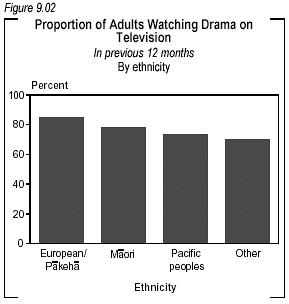

I hope you all learnt something from that!
Subscribe to:
Comments (Atom)
Tim, your links stink, you fink!
- John Bangsund's Threepenny Planet
- Broken Biro
- Poetry 24
- Superlative scribbles
- Kirstyn McD!
- Rorrim a tsomla almost a mirror
- More Sterne
- Sterne
- Cam the man from the Dan.
- Too hot to Raaaaaaandallllllll!
- Erin's Excellently Everlasting Effervescements!
- Slammy Infamy
- Hail Paco!
- Baron Blandwagon, purveyor of cyberbunnies, hawker of Roger Corman, and Misruler of the Multiverse
- The Bolta. Aiyeeeeee!!!!!
- Bad Apple Audrey
- The cartoon church
- Sir Martinkus
- A Zemblanian abroad and at home
- A hodge podge of hotzeplotz
- THE SLAMMA!
- Jottlesby's nottings, or should that be Nottlesby's jottings?
- The Snarking of the Hunt
- Jazzy Hands
- David of Metal City
- David the Barista
- The Blogger on the Cast Iron Balcony
- Be an Opinion Dominion Minion!
- Mel...
- ... and Fel
- His brilliant career - from whale sushi to crumbed prawn
- Jo Blogs
- Yet another Tim
- Croucherisms...
- Was two peas, now three peas
- Desciopolous!
- ... Still Life - now with extra rotating cats!
- Erin...
- An Amazingly Awesome Australian Ampersand!
- Blink and you'll miss 'er
- Red in the land of the tigers!
- Wire of Vibe
- Chase him, ladies, he's in the cavalry!
- The Non-palindromical Editrix in Germanium
- Old Sterne
- Gempiricalisations
- TonyT
- The briefs...
- ... and the brieflets
- The Purple Blog
- Blairville, lair of all that is wicked and perfidious
- The enticingly acronymical CSH
- EXTREEEEEEEME WYNTER!
- Mark of California
- Jellyfish
- Silent Speaking
- Lexicon the Mexican
Blog Archive
-
▼
2007
(392)
-
▼
June
(33)
- The Rants Pants
- A Suggested Cultural Activity
- How to not quite quit
- The Scent of Wet Office Worker
- Underpants of Mystery
- A provocative question
- A Meditation on Human Failings
- Teen Squeam
- A pointless post, in points
- Bottoms! Bottoms! Bottoms! Bottoms! Bottoms! Botto...
- Fat is unpatriotic
- The Weekly Fop #2: Duck Fops!
- Any Tense You've Got
- Footnote
- Fashion! Religion! Bad puns!
- Extra! Extra!
- Review: Jonathan Strange and Mr Norrell
- History Segment!
- They Don't Write Books Like They Used To...
- The Weekly Fop #1: Cerealism
- Please Do Not Apply
- An Announcement...
- An Afterthought...
- Too Twee for Two
- If Magazine Subscribers Were Like Football Fanatics
- For my next trick...
- Tennis? It's All A Load of Balls, Really...
- Six Word Phrases You May Not Want To Hear
- Tales From Earthsea
- A Band Called Rubber
- Postmodernism Explained
- All About Cows
- The Daily Tele Graph
-
▼
June
(33)

